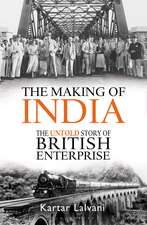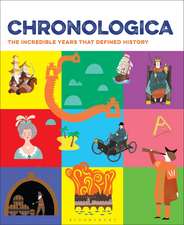Debating Modern Revolution: The Evolution of Revolutionary Ideas: Debates in World History
Autor Jack R. Censeren Limba Engleză Paperback – 10 feb 2016
| Toate formatele și edițiile | Preț | Express |
|---|---|---|
| Paperback (1) | 145.90 lei 3-5 săpt. | |
| Bloomsbury Publishing – 10 feb 2016 | 145.90 lei 3-5 săpt. | |
| Hardback (1) | 537.78 lei 6-8 săpt. | |
| Bloomsbury Publishing – 10 feb 2016 | 537.78 lei 6-8 săpt. |
Preț: 145.90 lei
Preț vechi: 169.82 lei
-14% Nou
Puncte Express: 219
Preț estimativ în valută:
27.92€ • 28.85$ • 23.22£
27.92€ • 28.85$ • 23.22£
Carte disponibilă
Livrare economică 26 februarie-12 martie
Preluare comenzi: 021 569.72.76
Specificații
ISBN-13: 9781472589637
ISBN-10: 1472589637
Pagini: 216
Dimensiuni: 138 x 216 x 15 mm
Greutate: 0.3 kg
Editura: Bloomsbury Publishing
Colecția Bloomsbury Academic
Seria Debates in World History
Locul publicării:London, United Kingdom
ISBN-10: 1472589637
Pagini: 216
Dimensiuni: 138 x 216 x 15 mm
Greutate: 0.3 kg
Editura: Bloomsbury Publishing
Colecția Bloomsbury Academic
Seria Debates in World History
Locul publicării:London, United Kingdom
Caracteristici
Chronologically structured with each section featuring debates between influential revolutionaries and counterrevolutionaries
Notă biografică
Jack R. Censer is Professor of History at George Mason University, USA. His recent publications include On the Trail of the D.C. Sniper: Fear and the Media (2010) and Liberty, Equality, Fraternity: Exploring the French Revolution (2001).
Cuprins
Section I. The Birth of the Modern Revolution (1700-1815)Section II. The Revolutionaries Regroup (1815-1848)Section III. The Spread of Revolution beyond Western Europe and the Americas (1848-1949)Section IV. The Post-Imperial World (1949-present)BibliographyIndex
Recenzii
While most studies of revolution attempt to uncover timeless similarities in the causes and development of revolutions, Censer explores the transformations over two and a half centuries of the concept of revolution itself: the dramatic evolution in the justifications, objectives, and strategies proposed by philosophers and practitioners from Thomas Paine and Karl Marx through Frantz Fanon, Che Guevara, and the Ayatollah Khomeini. It is an original and enormously engaging tour d'horizon of the subject in a global perspective, ideally suited for students young and old.
Censer has written a very readable narrative of revolution as a product of modern historical consciousness. Revolution has created an arc of self-redefinition; even as its meanings are layered, older ones are exchanged for newer ones to reach out to utopian ideals.
Jack Censer's aim is refreshingly bold: to conceptualise the different meanings of revolution in the modern era and to assess the importance of ideologies within them. He defines revolutions as cultural movements that set out to transform the existing order, both political and social, and in this book he adopts a global perspective, tracing the development of revolutionary ideas from America and France in the 1770s and 1790s to Iran and Tunisia today. The result is a wide-ranging and often provocative analysis that shows how the idea of revolution has evolved over the centuries and across continents.
Jack Censer has provided an enviably concise, lucid and thoughtful introduction to this crucially important subject. For anyone interested in understanding the ideas underpinning modern revolutions, and how the phenomenon of revolution itself developed through the modern period, Debating Modern Revolution is the perfect starting point.
This is a sharp and insightful book and students will find it very useful in dealing with a whole range of topics.
Censer has written a very readable narrative of revolution as a product of modern historical consciousness. Revolution has created an arc of self-redefinition; even as its meanings are layered, older ones are exchanged for newer ones to reach out to utopian ideals.
Jack Censer's aim is refreshingly bold: to conceptualise the different meanings of revolution in the modern era and to assess the importance of ideologies within them. He defines revolutions as cultural movements that set out to transform the existing order, both political and social, and in this book he adopts a global perspective, tracing the development of revolutionary ideas from America and France in the 1770s and 1790s to Iran and Tunisia today. The result is a wide-ranging and often provocative analysis that shows how the idea of revolution has evolved over the centuries and across continents.
Jack Censer has provided an enviably concise, lucid and thoughtful introduction to this crucially important subject. For anyone interested in understanding the ideas underpinning modern revolutions, and how the phenomenon of revolution itself developed through the modern period, Debating Modern Revolution is the perfect starting point.
This is a sharp and insightful book and students will find it very useful in dealing with a whole range of topics.














